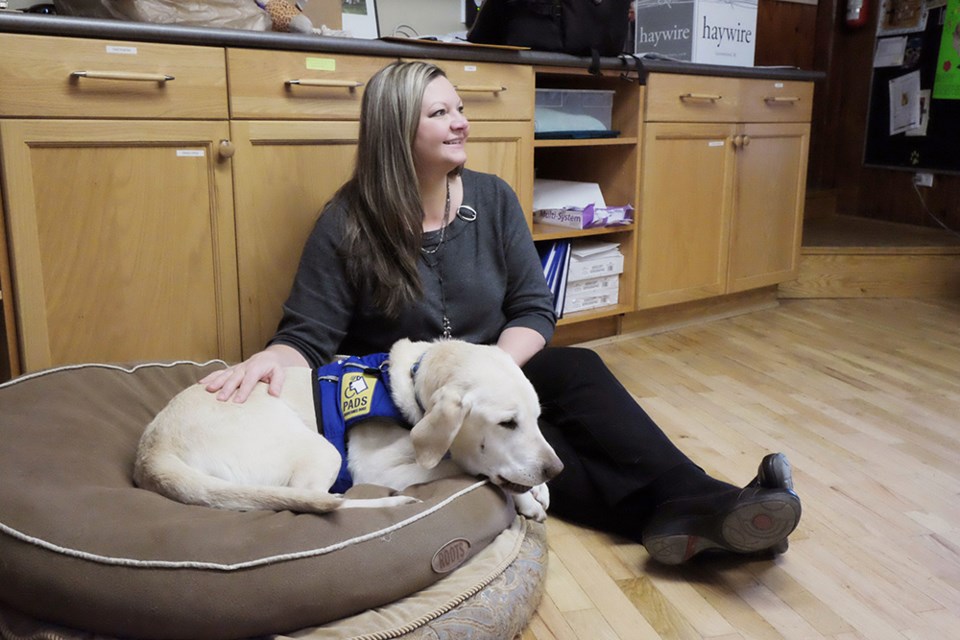Caber just has a special way of knowing.
About two years ago, Kim Gramlich, coordinator for the Delta Police Department's victims' services program, was dispatched to help a family who had just lost a son to homicide.
As always, Gramlich brought one of her most important tools: Caber, a golden Labrador retriever, trained by Pacific Assistance Dogs Society in Burnaby.
During the visit, the mother broke down on the living room floor, sobbing and gasping for breath.
That was Caber's cue. He walked over and laid his head on her shoulder. The weeping mother broke down even more, put her hands on his furry head and hugged him.
"He just knows, doesn't he?" she said.
After a few minutes, her breathing slowed, but Gramlich didn't know what to say.
"I never know how to reply to that question, because there is nothing that I have said or done to cause Caber to respond to a victim like this," Gramlich says. "He just does it, ... he just knows."
Caber is a six-year-old trauma assistance dog, brought in to help soothe victims of crime and make it easier for them to tell their stories. He has a very mellow, docile personality, and he seems to have a keen sense of knowing who's suffering. He's brought in for all types of crime: fatal car accidents, suicides, sudden deaths, break-and-enters, sexual abuse (especially with children) and homicide.
Caber is one of two trauma dogs from PADS, which mostly trains assistance dogs to help people with hearing and mobility challenges.
Caber's counterpart is Hawk, a four-year-old black Lab placed with Calgary police. Like Caber, Hawk works with victims of crime, and police paired him with a seven-year-old girl who had to testify in court against her father one month ago. The man was accused of sexually assaulting her as a toddler until she was put in foster care at age four.
In what may be the first-ever decision of its kind in Canada, the judge ruled that the girl could have the dog beside her as a support person while she testified via video from a special witness room. According to media reports of the trial, the girl pet Hawk, while he sat calmly by her side.
Laura Watamanuk, executive director at PADS, called the judge's decision an "industry changer."
"I think given what these children have gone through, to be able to have a support person that is non-judgmental, that is very calming and loving and comforting within the courts - I think that decision to allow the dog was a very positive move," she said.
Hawk's media attention has led to more calls from police interested in trauma dogs. The Calgary police have asked for a second canine, and PADS is fielding requests from police departments in Saskatchewan and B.C. Even the American FBI called, asking for a dog.
Trauma dogs in the U.S. are nothing new, but Watamanuk explained they are more often used in the court system, whereas PADS dogs are used from the initial onset of trauma.
But not every dog is cut out for the heavy emotional work of a trauma canine.
Trainers only select dogs with empathic, calm personalities that can soothe others while not taking on their stress, Watamanuk explained.
PADS trains 30 assistance dogs a year, but it's still not enough to keep up with rising demand for both trauma and assistance dogs. PADS also struggles with typical problems non-profits face: a never-ending need for volunteers and donations.
In the meantime, PADS trainers are keeping an eye out for young dogs with temperaments suitable for trauma work.
To donate or get involved with PADS, call 604-527-0556. They always need puppy-raisers, creative services and help fundraising.



